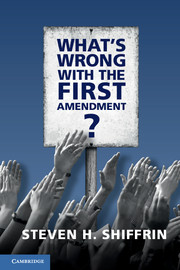10 - How Did We Get Here?
from PART III
Published online by Cambridge University Press: 05 September 2016
Summary
We have seen that Western countries treat speech regulation in far different ways than the United States. For the most part the approaches taken in Europe and Canada are similar to those taken in Israel, South Africa, and other countries. We have yet to explore why the United States is so different from the rest of the world when it comes to protecting speech. To put it another way, we have not yet explored the phenomenon of US free speech (including free press) exceptionalism. Many point to deep-seated cultural differences. I want to explore that, but I will ultimately argue that the differences arise from political, ideological, and interpretive disagreements – disagreements that are historically late-breaking.
Most of the literature on US exceptionalism has emphasized general cultural differences between Europe and the United States. And, of course, the differences between the United States and Europe range far beyond free speech. Consider our constitutional protection of the right to bear arms, our use of the death penalty, our failure to guarantee rights of food, clothing, housing, or medical care (and the degree we fall short in meeting these needs even for children), and the impossibility that an openly atheistic person could be elected to high political office. In assessing these differences, we might suppose that these general differences arise from large cultural distinctions that also affect free speech. Beyond freedom of speech, in terms of differences, as Stephen Gardbaum observes,
the standard list of differences includes economic systems (free market capitalism versus a mixed economy), political traditions (U.S. antigovernmentalism, top elective offices open to those with little or no political experience, and the absence of both a strong socialist movement and a professional, high-level civil service), work ethics and culture, moral and personal values, the contemporary roles of religion and extent of religious belief, attachment to firearms, unique team sports, senses of humor, and forms of self-presentation. The explanations of these differences are, of course, legion and much disputed, but they include the United States’ newness, existence and status as the product of the first successful colonial revolution, geography, political isolation and isolationism, a long period of buoyant economic self-sufficiency, and demographics as a heterogeneous and non-organic immigrant society.
- Type
- Chapter
- Information
- What's Wrong with the First Amendment , pp. 159 - 183Publisher: Cambridge University PressPrint publication year: 2016



